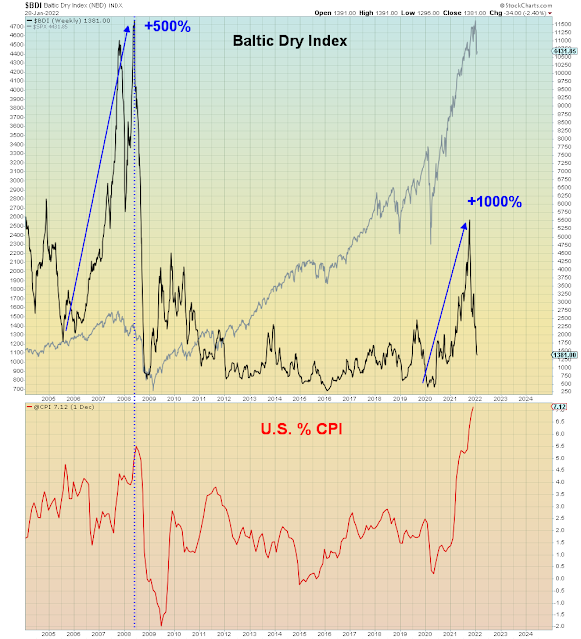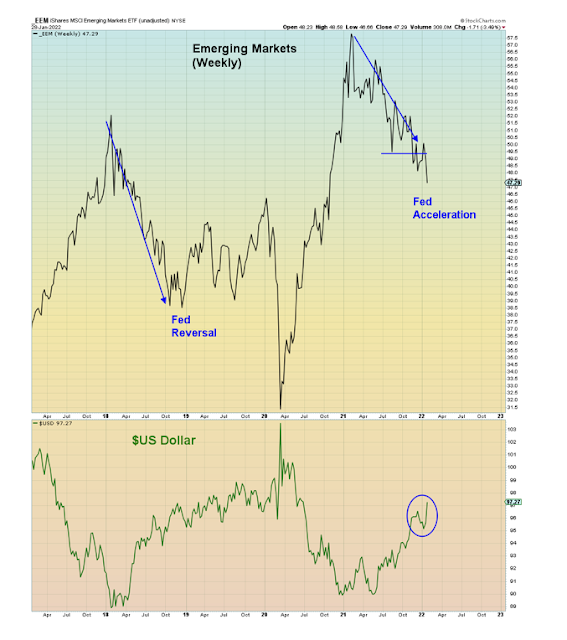"The Sea On The Tide Has No Way Of Turning"
This week the Fed and Wall Street were in consensus, we need to accelerate this meltdown:
Step back for perspective...
At the lingering end of a two year pandemic the global economy is struggling to regain normalcy. History's largest asset bubble is imploding and the Federal Reserve has decided to embark on accelerated tightening. The growth stock crash is approaching the one year mark with certain key sectors having already given back all of their pandemic gains and or -40% deep bear market: Chinese internets, Biotechs, Fintechs, Ark Innovation, IPOs, EVs/green energy, Cryptos, ecommerce, momentum Tech etc.
The losses are STAGGERING. Multiples of 2008 subprime.
Wiped out Millennials are abandoning the market, as the era's most popular online broker, Robinhood is down -90% from its 2021 IPO high.
The Nasdaq was down -19% at the week's low and then bounced ahead of the seminal FOMC meeting. The S&P 500 is holding up better as hedge funds rotate en masse to cyclical stocks. Therefore, it remains record over-valued by every known metric.
The Fed now believes that inflation is the ONLY risk to markets and the economy and that they are behind the curve. They are happily ignoring the reverse wealth effect as the air comes out of their asset bubble. The inflation the Fed is concerned about is a lingering remnant of the pandemic which exacerbated supply side shortages. The Fed's inflation gauges are at a 40 year high on a relative basis, whereas most commodity prices are substantially below their 2008 highs. The Baltic Dry index which is a leading indicator for U.S.. inflation shows the problem with focusing on percentages versus absolute price levels, ESPECIALLY following a depressionary pandemic.
Bad data leads to bad decisions.
On the labor side, the jobs market is very tight due to mass layoffs during the pandemic. Many former employees have either retired early (3 million Boomers) or moved to gig jobs. The Fed's models ignore ALL of these pandemic-related factors , which make their economic models OBSOLETE and totally useless.
They are flying blind straight into the ground.
"The Fed has admitted that it is seriously behind the curve"
Aggressive Fed tightening should affect the economy with a lag"
The biggest policy error since September 2008 just took place this week. And to celebrate the occasion, consumer sentiment collapsed to that same level:
Consumer discretionary stocks are flirting with bear market on decade high volume.
The Wilshire/S&P ratio worst since October 2008:
Emerging Markets got monkey hammered this week by the rising dollar.
Global market dislocations ended Fed tightening in 2015 AND in 2018.
This time Powell and Fed are totally ignoring global markets.
Unfortunately, there is no bullish case anymore. Up until now the entire bull case which ignored valuations, was based upon the ubiquitous belief that printed money is the secret to effortless wealth. Now that argument no longer exists. However, there remains an industry of financial salesmen who need sheeple to continue buying financial junk through all types of market risks and at the end of the cycle.
THAT is why we find ourselves at this perilous juncture where fear of missing out is the only risk today's investors understand.
"Despite the deep losses in tech stocks, there’s still an appetite for risk among the retail crowd"
"Stock funds have absorbed $84 billion this year and just two out of the 18 trading days have seen outflows"
In summary, the Fed is wrong. AGAIN.
The economists who believe the Fed, are wrong. AGAIN.
And the consequences are already exorbitant, on their way to unaffordable.
This era's fantasy that central banks can bail out investors from unlimited amounts of risk is filed under the long forgotten lesson of moral hazard. The muscle memory of which lingers long after the safety net has already been removed.
mor·al haz·ard
"The lack of incentive to guard against risk where one is protected from its consequences"









